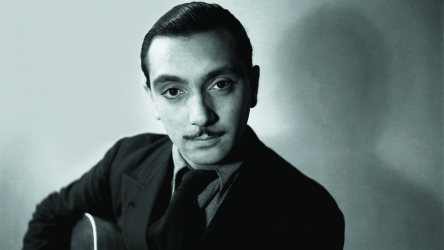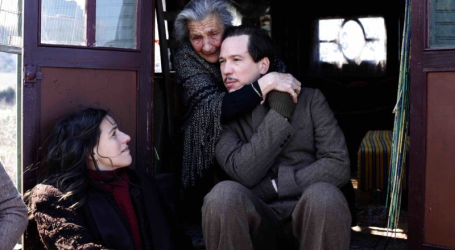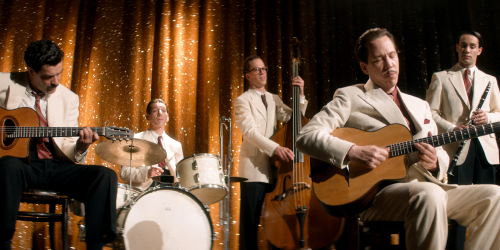I didn’t really know anything about Django Reinhardt going into this film, other than I liked the way he played guitar. Having seen the movie Django, I’m convinced I know less about him now than when I went in. Well, after seeing it and doing a cursory look at history. However, historical accuracy is barely relevant to a good movie, so let us tread forward and see about this historical fiction from Etienne Comar (Timbuktu).

First of all, the real Django was in black and white.
It’s 1943 Paris, and careless—the blurbs describe him as “carefree” but he’s kind of a reckless, arrogant drunk, so I’m going with “careless”—master guitarist Django is commanding big bucks in occupied Germany, when the worst possible thing happens: The Nazis want him to do a tour in Germany. Django (who’s married and whose wife is expecting) escapes to a town on the border of Switzerland with the help of a former and occasional lover (and, in real life, distant cousin) only to get stranded there waiting for someone to escort him, his wife and mother across the border.
Soon desperate for money, he begins playing in local pubs with his gypsy pals. (Django is a gypsy—and he only had the use of the first three fingers of his left hand!) This does not, as you might expect, lead to his discovery from someone walking in and saying “Hey, that’s Django!” Instead, there’s a bar fight and when the Nazis are rounding up all the non-Nazi, the Nazi who kicks him out of his house arrests him for being a troublemaker, but he is saved the next morning by his cousin/lover who admonishes him to do a performance for the Nazis before going back to Paris (at which point, he’ll presumably have to tour Germany).

A musician with a mistress? Slander! Calumny! Flagrancy!
This leads to a climactic scene where his playing is used to cover a daring escape/rescue of a pilot into Switzerland, as he seductively turns the Nazis into dancing sex fiends or something. It’s a pretty good cinematic moment that underscores the basic problem of the movie as a whole: It’s basically historical fiction that doesn’t “commit to the bit” as @DiversityAndCmx would say. (He’s far from the originator of the phrase but he seems to have made it popular in a big way lately.)
In real life, Django tried to escape Switzerland three times. The first couple of times he was captured, though with no apparent consequences. The time depicted in the film—where he leaves his mother and pregnant wife behind for theirs and his safety—he actually ventured out solo (as opposed to abandoning them on the trip) and made it to the Swiss border, where the Swiss promptly turned him back, probably because he was a gypsy.
So, we have a film that’s perfectly comfortable taking massive liberties with the facts, and yet misses out on the obvious potential for suspense. It runs close to two hours but The Boy and I both felt it could’ve been 15-20 minutes shorter. The extra time seems to defuse the urgency. I mean, he’s playing in a club on the Swiss border that’s frequented by Nazis and yet there are no near misses.

His mother doesn’t even TRY to strangle him in this scene.
It almost feels like they set up all these dramatic moments and then felt too ashamed to actually exploit them. Some of the time was used to showcase Django’s music, which was fine—but for a remarkably large portion of it was not used. There’s no music, nothing happening, it’s just very slack. The Boy visited the bathroom and came back and there wasn’t really anything to fill him in on.
We liked it but. Not a whole lot. The lead’s pretty good. The acting is generally good. It’s all done competently and…I’d say it’s about at a good TV movie level. It’s the only time we’ve seen anything about the Nazis persecuting Gypsies that we can recall, which is something. But as I’ve noted before, the bar for this kind of movie is actually pretty high. We will probably see several better movies this year on Nazi atrocities.
Why it’s always gotta be Nazis is another kettle of fish, of course. Ooh, if you’re a guitarist you might enjoy the simulated Django playing, just on a technical level. I noticed that a lot of the closeups, Django’s hands got real old real fast. Not sure who the stunt double was.

After the war, Django opens for Frankie Valli.
